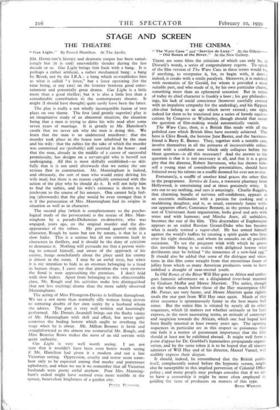THE CINEMA -
"The Ware Case" and "Service de Luxe." At the Odeon-.-- "Old Bones of the River." At the New Gallery.
THERE are some films the criticism of which can only be, in Disraeli's words, a series of congratulatory regrets. To speak of the film version of The Ware Case in these terms would be,
if anything, to overpraise it, for, to begin with, it dates ; indeed, it creaks with a senile paralysis. Moreover, it is redolent with memories of Sir Gerald, for whom it provided a most suitable part, and who made of it, by his own particular charm, something more than an ephemeral sensation But in terms of today its chief character is frankly a bore ; his gay philander- ings, his lack of social conscience (however carefully crossed with an impulsive sympathy for the underdog), and his flippant chit-chat belong to an age which never existed ; one sighs indeed for them to be translated into a series of bawdy equivo- cations by Congreve or Wycherley, though should that occur the question of film-making would automatically vanish.
The Ware Case, then, is a British film made with all the polished care which British films have recently achieved. The
hero is Clive Brook, the heroine Jane Baxter, and the barrister- friend is Barry K. Barnes. They, together with a notable cast, involve themselves in all the postures of inconceivable refine- ment with a confident ease which only collapses before the blunt question—is all this necessary? And the answer to the question is that it is not necessary at all, and that it is a great pity that the director, Robert Stevenson, who has shown him-
self a young man of considerable potentialities, should have frittered away his talents on a soufflé doomed for ever not to rise. Fortunately, a soufflé of another kind graces the other film in the programme. Service de Luxe, a transient phantasy from
Hollywood, is entertaining and at times genuinely witty. It sets out to say nothing, and says it amusingly. Charlie Ruggles, that charming bundle of nervous self-Confidence, appears as an eccentric millionaire with a passion for cooking and a
maddening daughter, and is, as usual, extremely funny with- out apparent effort; Constance Bennett, as the genius behind a
sort of Universant Aunt organisation, looks good and acts with sense and with humour; and Mischa Auer, all unbidden, becomes the star of the film. This descendant of Euphrosyne appears as an exiled Russian Grand-Duke who has become what is neatly termed a super-chef. He has armed himself against the world's buffets by creating a spirit guide who lives over his right shoulder, and whom he consults on all possible occasions. To see the pregnant wink with which he greets this invisible being is to realise with• delighted horror what
devilments may be behind "the innocence of a new-laid egg." It should also be added that some of the dialogue and situa- tions in this film come straight from that mysterious fount of jollity from which so many American producers seem to have imbibed a draught of near-eternal youth.
In Old Bones of ate River Will Hay goes to Africa and under- goes fantastic adventures on a dilapidated river-boat manned
by Graham Moffat and Moore Marriott. The antics, though
on the whole much below those of the Hay masterpiece Oh! Mr. Porter, are very funny, and Moore Marriott quite rightly
steals the star part from Will Hay once again. Much of this river sequence is spontaneously funny in the best music hall sense. But the entire film is vitiated by nearly all its other sequences, which (it matters not whether seriously or for fun) express, in the most nauseating terms, an attitude of contempt and suspicion towards the African, which one had hoped had been finally interred at least twenty years ago. The opening, sequences in particular are in this respect so poisonous that one feels it a matter of paramount importance that the film
should at least not be exhibited abroad. It might well form a point d'appui for Dr. Goebbel's humourless propaganda organi- sation, and by the same token it is to be hoped that all sincere admirers of Will Hay and of his director, Marcel Varnel, will audibly express their disgust.
It should, indeed, be remembered that the British public itself, complacently seated before the hypnotic screen, might also be susceptible to this implied perversion of Colonial Office policy ; and many people may perhaps consider that if we are to have a censorship it might be more often employed in guiding the taste of producers on matters of this type.
BASIL WR/GHT.














































 Previous page
Previous page